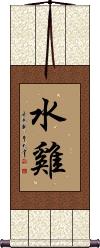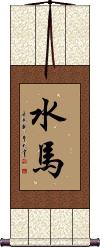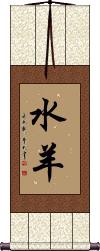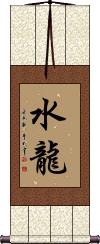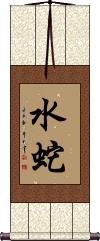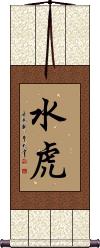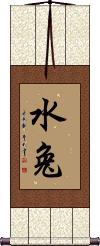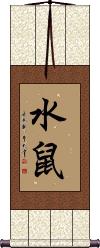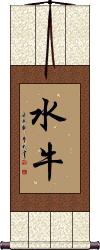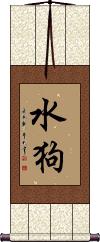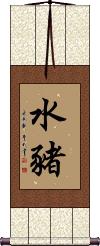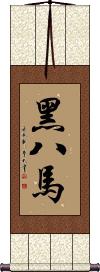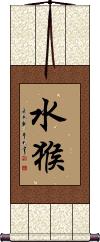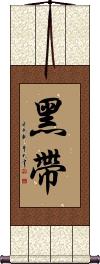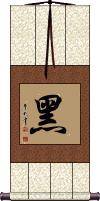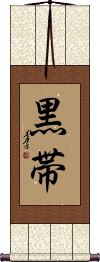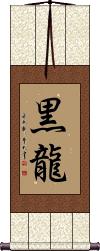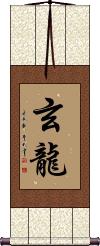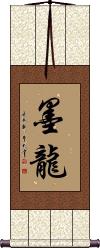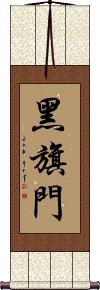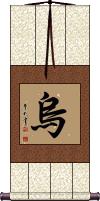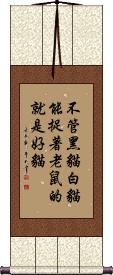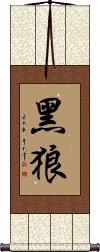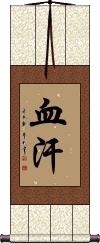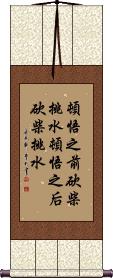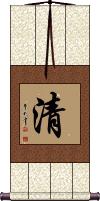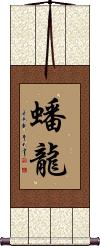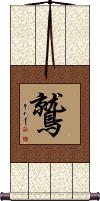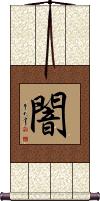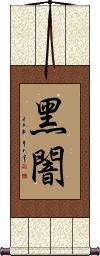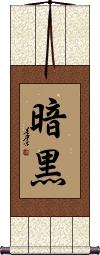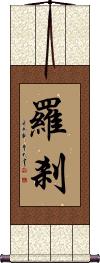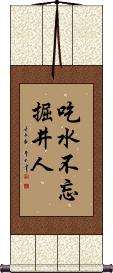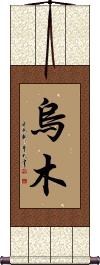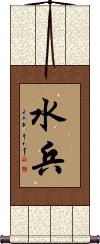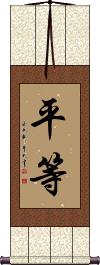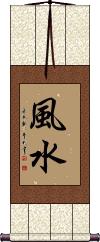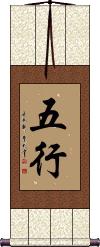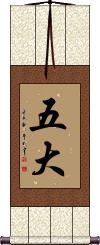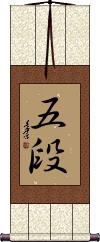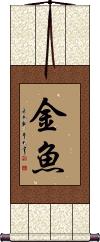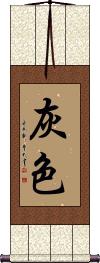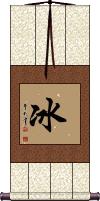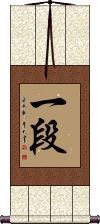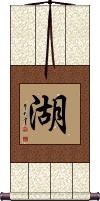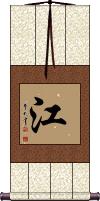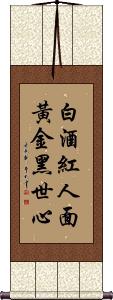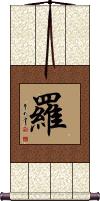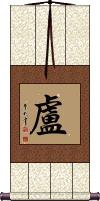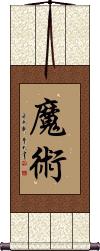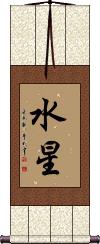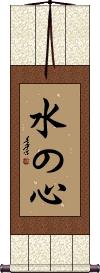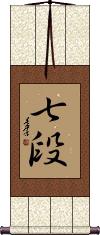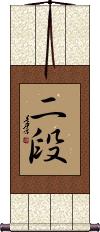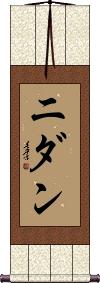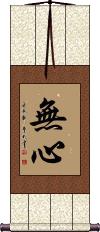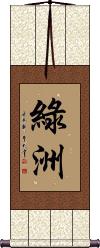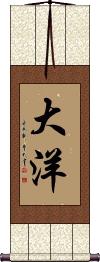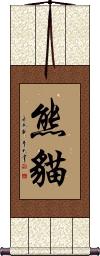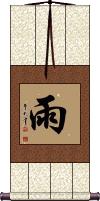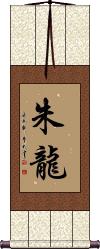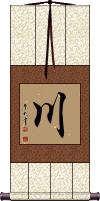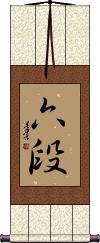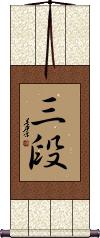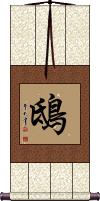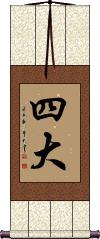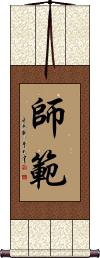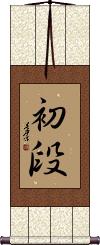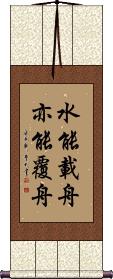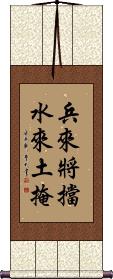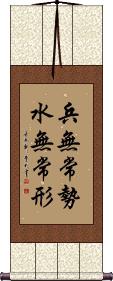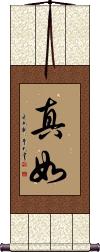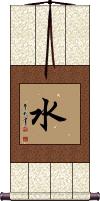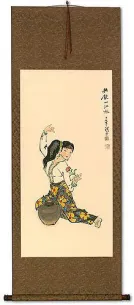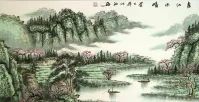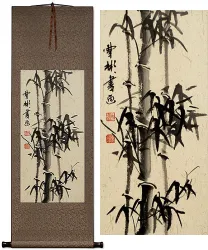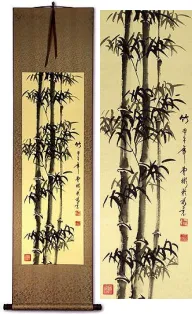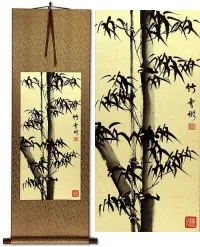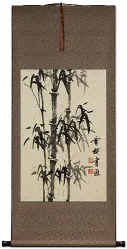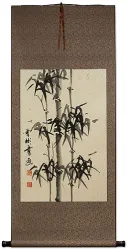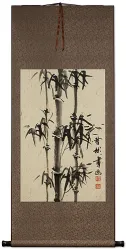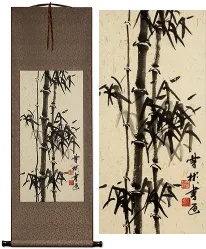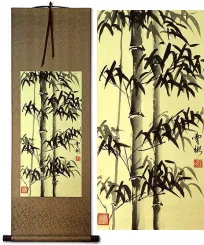Many custom options...
And formats...

Not what you want?
Try other similar-meaning words, fewer words, or just one word.
Black Goo in the Water Bug I Killed in Chinese / Japanese...
Buy a Black Goo in the Water Bug I Killed calligraphy wall scroll here!
Personalize your custom “Black Goo in the Water Bug I Killed” project by clicking the button next to your favorite “Black Goo in the Water Bug I Killed” title below...
Switched to secondary search mode due to lack of results using primary.
These secondary results may not be very accurate. Try a different but similar meaning word or phrase for better results. Or...
Look up Black Goo in the Water Bug I Killed in my Japanese Kanji & Chinese Character Dictionary(My dictionary is a different system then the calligraphy search you just tried)
If you want a special phrase, word, title, name, or proverb, feel free to contact me, and I will translate your custom calligraphy idea for you.
2. Water Horse
4. Water Dragon
5. Water Snake
6. Water Tiger
7. Water Rabbit
8. Water Rat
10. Water Dog
11. Water Pig/Boar
13. Water Monkey
14. Black Belt
15. Be Like Water
17. Benzaiten
18. Black
19. Black Belt
20. Rank Holder
21. Black Dragon
22. Black Flag Gate / Hek Ki Boen
23. Black Raven
24. Black or white cat matters not as long as it can catch mice
26. Black Tiger Fist
27. Black Wolf
30. Clarity
31. Water Dragon / Coiled Dragon
33. Dark Angel
34. Darkness
36. Demon / Raksha
37. Drinking the water of a well: One should never forget who dug it
38. Dripping Water Penetrates Stone
40. Ebony
41. Enlisted Sailor
42. Equality
43. Feng Shui
44. The one who retreats 50 paces mocks the one to retreats 100
45. Fire and Water Have No Mercy
46. Five Elements
48. Flower in the Mirror, Moon on Water
50. Four Elements
51. Put out a burning wood cart with a cup of water
52. Giant Panda
54. Go-Dan / 5th Degree Black Belt
55. Goldfish
56. Ultimate Goodness of Water
57. Gray Color
59. Ice / Frost
61. Ku-Dan
62. Lake
63. Large River
64. Just as Liquor Turns a Face Red, Gold Turns a Heart Black
65. Lo
66. Loo
67. Magic
69. Mercury
70. Mind Like Water
71. Nana-Dan / 7th Degree Black Belt
72. Ni-Dan
73. Nidan
74. No Mind / Mushin
75. Oasis
76. Great Sea
77. Panda Bear
78. Rain
79. Red Dragon / Vermillion Dragon
80. A Rising Tide Lifts All Boats
81. River
82. Roku-Dan / 6th Degree Black Belt
83. San-Dan
85. Shichi-Kyu
87. Shihan
88. Sho-Dan
89. Not Only Can Water Float A Boat, It Can Sink It Also
90. Soldiers Adapt Actions to the Situation
91. Warriors Adapt and Overcome
92. Tathata / Ultimate Nature of All Things
93. Thuy
95. Water
Water Rooster
The Year of the Water Rooster
水雞 is Water Rooster in Chinese.
In the Chinese zodiac and sexagenary (60-year) cycle, this combination occurs in years that include 1873, 1933, 1993, and 2053.
In the sexagenary cycle, this year is represented by 癸酉.
See Also: Rooster
Water Horse
The Year of the Water Horse
水馬 is Water Horse in Chinese.
In the Chinese zodiac and sexagenary (60-year) cycle, this combination occurs in years that include 1882, 1942, 2002, and 2062.
In the sexagenary cycle, this year is represented by 壬午.
See Also: Horse
Water Goat/Sheep
The Year of the Water Goat/Sheep
水羊 is Water Goat/Sheep in Chinese.
In the Chinese zodiac and sexagenary (60-year) cycle, this combination occurs in years that include 1883, 1943, 2003, and 2063.
In the sexagenary cycle, this year is represented by 癸未.
See Also: Goat/Sheep
Water Dragon
The Year of the Water Dragon
水龍 is Water Dragon in Chinese.
In the Chinese zodiac and sexagenary (60-year) cycle, this combination occurs in years that include 1892, 1952, 2012, and 2072.
In the sexagenary cycle, this year is represented by 壬辰.
See Also: Dragon
Water Snake
The Year of the Water Snake
水蛇 is Water Snake in Chinese.
In the Chinese zodiac and sexagenary (60-year) cycle, this combination occurs in years that include 1893, 1953, 2013, and 2073.
In the sexagenary cycle, this year is represented by 癸巳.
See Also: Snake
Water Tiger
The Year of the Water Tiger
水虎 is Water Tiger in Chinese.
In the Chinese zodiac and sexagenary (60-year) cycle, this combination occurs in years that include 1902, 1962, 2022, and 2082.
In the sexagenary cycle, this year is represented by 壬寅.
See Also: Tiger
Water Rabbit
The Year of the Water Rabbit
水兔 is Water Rabbit in Chinese.
In the Chinese zodiac and sexagenary (60-year) cycle, this combination occurs in years that include 1903, 1963, 2023, and 2083.
In the sexagenary cycle, this year is represented by 癸卯.
See Also: Rabbit
Water Rat
The Year of the Water Rat
水鼠 is Water Rat in Chinese.
In the Chinese zodiac and sexagenary (60-year) cycle, this combination occurs in years that include 1912, 1972, 2032, and 2092.
In the sexagenary cycle, this year is represented by 壬子.
See Also: Rat
Water Ox/Bull
The Year of the Water Ox/Bull
水牛 is Water Ox/Bull in Chinese.
In the Chinese zodiac and sexagenary (60-year) cycle, this combination occurs in years that include 1913, 1973, 2033, and 2093.
In the sexagenary cycle, this year is represented by 癸丑.
See Also: Ox/Bull
Water Dog
The Year of the Water Dog
水狗 is Water Dog in Chinese.
In the Chinese zodiac and sexagenary (60-year) cycle, this combination occurs in years that include 1922, 1982, 2042, and 2102.
In the sexagenary cycle, this year is represented by 壬戌.
See Also: Dog
Water Pig/Boar
The Year of the Water Pig/Boar
水豬 is Water Pig/Boar in Chinese.
In the Chinese zodiac and sexagenary (60-year) cycle, this combination occurs in years that include 1923, 1983, 2043, and 2103.
In the sexagenary cycle, this year is represented by 癸亥.
See Also: Pig/Boar
Eight Black Horses
Water Monkey
The Year of the Water Monkey
水猴 is Water Monkey in Chinese.
In the Chinese zodiac and sexagenary (60-year) cycle, this combination occurs in years that include 1872, 1932, 1992, and 2052.
In the sexagenary cycle, this year is represented by 壬申.
See Also: Monkey
Black Belt
黑帶 is “black belt” in Chinese.
Many will argue whether rank systems that include a “black belt” are used in pure Chinese martial arts systems. The argument goes that it's more a Japanese idea merged into the western versions of Chinese martial arts. However, in Wushu (often referred to as Kung Fu), it's said that all students started with white belts. Over the years of training, the white belt would get dirty until finally appearing black with filth. Thus, more advanced students had darker belts.
If you want this title in Chinese, this would be the form.
![]() Often, the second character is written like the image to the right. If you like this version, click on this character instead of the button above.
Often, the second character is written like the image to the right. If you like this version, click on this character instead of the button above.
Be Like Water
像水一樣 is a short quote from a much longer statement by Bruce Lee.
He summarized how people should be flexible to all circumstances, attacks, or situations. In the end, he exclaims, “Be like water, my friend.” 像水一樣 is the “Be like water” part alone since that seems to be what most people want.
Beautiful Woman Proverb
沈魚落雁 is an old proverb that literally means “fish sink, goose alights.”
...But this takes some explaining. This is a proverb from Zhuangzi (莊子), who lived in the late 4th century BC.
This figuratively refers to female beauty that is so captivating that even the birds and beasts take notice.
Perhaps a better and more accurate way to describe this is to say that it speaks of the charms of a uniquely beautiful woman who is so beautiful that fish stay on the bottom of the water and flying wild geese fall from the sky in shame.
This proverb is so famous that it is also known and used in Japan (same characters, different pronunciation).
Note: This can also be written 沉魚落雁 instead of 沈魚落雁 (just the first character varies slightly).
Benzaiten
弁財天 is a Buddhist term that can be translated or transliterated as Benzaiten or Saraswati.
弁財天 is the Buddhist goddess of music, eloquence, wealth, and water.
This goddess of eloquence came into Buddhism from the Hindu goddess Saraswati. Benzaiten and Saraswati are considered by most to be one and the same. However, in Japanese culture, Benzaiten has been conflated with several other deities.
Black
黑 is the color black in Chinese, Japanese, and old Korean Hanja.
In some contexts, this can mean “dark” or “evil.”
![]() There is an alternate form of this character which is commonly used in modern Japan (shown to the right). If you want this alternate/Japanese form, just click on the character to the right, instead of the button above.
There is an alternate form of this character which is commonly used in modern Japan (shown to the right). If you want this alternate/Japanese form, just click on the character to the right, instead of the button above.
Black Belt
These are the Kanji for “Black Belt” in Japanese.
This would be the gift to buy someone who is about to achieve the rank of black belt, or perhaps for yourself, like a certificate on the wall to subtly show your accomplishment.
It should be mentioned that the title “black belt” is not a typical selection for a calligraphy wall scroll.
Note: with a tiny stroke difference on the second character, this also means black belt in Korean Hanja. Let me know if you need the exact Korean version (though any Korean who can read Hanja will know this is black belt).
Rank Holder
The one who has achieved rank in martial arts
有段者 is a Japanese term for someone who holds rank in karate, judo, etc.
This term theoretically applies to anyone with rank (above a white belt). However, some schools or dojos may reserve this title for a holder of a black belt.
I'd suggest that you only order this phrase if you have honestly reached this level.
This title does kind of make sense in Chinese but only to those Chinese who practice “kong shou dao” (karate) or when used in the context of martial arts.
Black Dragon
Black Dragon
Black Dragon
Black Flag Gate / Hek Ki Boen
Black Raven
烏 can mean raven or crow but is also used as an alternate way to write the color black.
Therefore, this is a symbol of the black raven (with emphasis on black). This can also mean rook or dark.
Notes: This can be the Japanese surname Karasu, or Chinese surname Wu.
Black or white cat matters not as long as it can catch mice
Ability is more important than looks
不管黑猫白猫能捉着老鼠的就是好猫 literally translates as: It doesn't matter [if a] cat [is] black [or] white, [as long as it] can catch mice, it's a good cat.
This proverb was either composed or made famous by Deng XiaoPing in 1961 when he exclaimed, “I don't care if it's a white cat or a black cat. It's a good cat so long as it catches mice” when his critics pointed out that his ideas were Capitalistic (free market). The response was meant to say, “It does not matter if it's Communist or Capitalist, as long as it works.”
This is a Chinese proverb that can be used to suggest one should disregard looks or a person's race, as long as they can do the job. It can also be used as a metaphor for many other situations.
Deng XiaoPing probably saved China from collapse (as the Soviet Union experienced). He changed China’s economy from pure Communism to a hybrid where the free market (Capitalism) is encouraged. More about Deng XiaoPing
Black Dragon Ninjitsu
Black Tiger Fist
Black Wolf
Blood Sweat and Tears
Chop Wood, Carry Water
Before enlightenment or after, chores remain.
頓悟之前砍柴挑水; 頓悟之後砍柴挑水 means “Before enlightenment, chop wood, carry water; After enlightenment, chop wood, carry water.
This is a Chinese proverb that is attributed to 吴力 (Wú Lì) who lived between 1632 and 1718 - living part of his life as a devout Buddhist, and many years as a Catholic Jesuit Priest in China - what an interesting life!
This has been explained many times in many ways. I am a Buddhist, and here is my brief take on this proverb...
Before enlightenment, one may find daily chores mundane, tedious, and boring. However, upon reaching enlightenment one is not relieved of the details of daily life. An enlightened person will, however, see such chores as a joy, and do them mindfully.
There is another version floating around, which is 在你領悟之前砍柴、運水。在你領悟之後,砍柴、運水。
If you want this other version, just contact me. The meaning is the same, just different phrasing.
Clarity
清 is a word that means clarity or clear in Chinese, Japanese Kanji, and old Korean Hanja.
Looking at the parts of this character, you have three splashes of water on the left, “life” on the top right, and the moon on the lower right.
Because of something Confucius said about 2500 years ago, you can imagine that this character means “live life with clarity like bright moonlight piercing pure water.” The Confucian idea is something like “Keep clear what is pure in yourself, and let your pure nature show through.” Kind of like saying, “Don't pollute your mind or body, so that they remain clear.”
This might be stretching the definition of this single Chinese character but the elements are there, and “clarity” is a powerful idea.
Korean note: Korean pronunciation is given above but this character is written with a slight difference in the "moon radical" in Korean. However, anyone who can read Korean Hanja, will understand this character with no problem (this is considered an alternate form in Korean). If you want the more standard Korean Hanja form (which is an alternate form in Chinese), just let me know.
Japanese note: When reading in Japanese, this Kanji has additional meanings of pure, purify, or cleanse (sometimes to remove demons or "exorcise"). Used more in compound words in Japanese than as a stand-alone Kanji.
Water Dragon / Coiled Dragon
Black Eagle / Condor
鷲 is the way to write black eagle or condor in Chinese.
It means eagle (sometimes vulture) in Japanese Kanji. 鷲 hasn't been in common use in Korean for hundreds of years, so it's hard to say what bird it represented in old Korean Hanja.
There are other multi-character words that express different specific species of birds of prey (bald eagle, osprey, golden eagle, etc).
If you need a more specific title, just contact me.
Dark Angel
Darkness
闇 is the shortest and universal way (in Chinese, Japanese Kanji, and old Korean Hanja) to write “darkness.”
In Chinese, this can mean dark, gloomy, hidden, secret, to shut the door, or unilluminated.
In Japanese, this can mean darkness, the dark, black-marketeering, dark, shady, or illegal.
In old Korean Hanja, this can mean dark, obscure, hidden, or secret.
![]() Note that there is an alternate form of this character. It is used as an alternate in all three languages (that rarely happens). You can see this alternate version to the right. If you want to order that version, please click on that character, instead of the button above.
Note that there is an alternate form of this character. It is used as an alternate in all three languages (that rarely happens). You can see this alternate version to the right. If you want to order that version, please click on that character, instead of the button above.
Darkness
黑闇 is the two-character Chinese word for darkness.
The first character alone means black or dark.
The second character has several possible meanings, depending on context; They include: to shut the door, unilluminated, dark, gloomy, hidden, or secret.
Together, these two characters will, in most cases, be translated as dark or darkness.
Darkness
Frightful Demon / Asura
This demon title comes from the ancient Sanskrit word Asura.
阿修羅 is often used in Buddhism when describing various demons. Sometimes defined as “Fighting and battling a giant demon.”
In the context of Buddhism: This title originally meant a spirit, spirits, or even the gods (perhaps before 1700 years ago). It now generally indicates titanic demons, enemies of the gods, with whom, especially Indra, they wage constant war. They are defined as “not devas,” “ugly,” and “without wine.” There are four classes of asuras, separated according to their manner of rebirth. They can be egg-born, womb-born, transformation-born, and spawn- or water-born. Their abode is in the ocean, north of Sumeru but certain of the weaker dwell in a western mountain cave. They have realms, rulers, and palaces, as have the devas.
In terms of power, Asuras rank above humans but below most other deities. They live near the coastal foot of Mount Sumeru (on the northern side). Their domain is partially or wholly in the ocean.
Demon / Raksha
羅剎 is the Chinese version of demon that comes from the ancient Sanskrit word raksha, raksasa (rākṣasa), raksas (rakṣas), or raksasi (rākṣasī).
This title regards malignant spirits and demons. These demons are described in ancient texts as terrifying, with black bodies, red hair, and green eyes, and as devourers of men.![]() FYI: Sometimes the second character is written in the form shown to the right.
FYI: Sometimes the second character is written in the form shown to the right.
Drinking the water of a well: One should never forget who dug it
This proverb suggests that one should always be grateful to those who helped one succeed.
And remember your ancestors and those that came before you whose sacrifices made your present life better.
Some Chinese will separate the intended meaning from this proverb and translate this as “Don't forget the people who once helped you.” In Modern China, this idiom is virtually never used to refer to an actual well.
Note: This can be pronounced in Korean but it's not a commonly used phrase.
Dripping Water Penetrates Stone
滴水穿石 is a Chinese proverb that means, dripping water penetrates stone.
The figurative meaning can be translated as:
Constant perseverance yields success.
You can achieve your aim if you try hard without giving up.
Persistent effort overcomes any difficulty.
While 滴水穿石 is the most common character order, you will likely see 水滴石穿, might see 滴水石穿, and will rarely see 小水穿石 in the wild.
Earth Fire Water Air
Ebony
Enlisted Sailor
Equality
In Chinese, 平等 is the word that describes equality among all humans.
Yes, this is equality that means equality no matter of religion, whether you are rich or poor, gay or straight, black white or yellow.
In Japanese and Korean, this can be defined as equality, impartiality, and evenness (basically the same as the Chinese meaning).
Feng Shui
風水 is the famous technique and approach to arranging your home externally around natural features and internally to create balance and peace.
These two characters literally mean “wind water.” Obviously, the title is far more simple than the concept behind this subject.
It may enlighten you slightly to know that the character for “wind” can also mean style, custom, or manner in some contexts. This may apply somewhat to this title.
In a technical sense, this title is translated as Chinese geomancy.
The one who retreats 50 paces mocks the one to retreats 100
The pot calls the kettle black
五十步笑百步 is a Chinese proverb that means the one who retreats 50 paces mocks the one who retreats 100 paces.
During the Warring States Period of what is now China (475 - 221 B.C.), the King of Wei was in love with war. He often fought with other kingdoms just for spite or fun.
One day, the King of Wei asked the philosopher Mencius, “I love my people, and all say I do the best for them. I move the people from famine-stricken areas to places of plenty and transport grains from rich areas to the poor. Nobody goes hungry in my kingdom, and I treat my people far better than other kings. But why does the population of my kingdom not increase, and why does the population of other kingdoms not decrease?”
Mencius answered, “Since you love war, I will make this example: When going to war, and the drums beat to start the attack, some soldiers flee for their lives in fear. Some run 100 paces in retreat, and others run 50 steps. Then the ones who retreated 50 paces laugh and taunt those who retreated 100 paces, calling them cowards mortally afraid of death. Do you think this is reasonable?
The King of Wei answered, “Of course not! Those who run 50 paces are just as timid as those who run 100 paces.”
Mencius then said, “You are a king who treats his subjects better than other kings treat their people, but you are so fond of war that your people suffer from great losses in battle. Therefore, your population does not grow. While other kings allow their people to starve to death, you send your people to die in war. Is there any difference?”
This famous conversation led to the six-character proverb shown here. It serves as a warning to avoid hypocrisy. It goes hand-in-hand with the western phrase, “The pot calls the kettle black,” or the Biblical phrase, “Before trying to remove a splinter from your neighbor's eye, first remove the plank from your own eye.”
Fire and Water Have No Mercy
Five Elements
五行 is the title of the five elements: wood, fire, water, earth, and metal.
The first character means five, and the second character is simply element(s).
According to ancient Chinese science, all matter in the world is comprised of these elements. One idea presented with the five elements is that when energy is added, the matter is believed to expand. When energy is removed, matter contracts. Oddly, this concept is not far from Einstein's theories and modern science. Just a few thousand years before Einstein.
More info: Wikipedia - Five Elements (Wu Xing).
See Also: Wood | Fire | Water | Earth | Metal | Five Elements
Five Elements
金木水火土 is a list of the Chinese characters for the five elements in a comfortable order (meaning that they “feel right” to a Chinese person who views this arrangement).
The order is metal, wood, water, fire, and earth.
Note that sometimes the metal element is translated as gold. And earth refers to soil versus the whole planet earth.
Five Elements
地水火風空 is the specifically-Japanese version of the five elements.
This is a little different than the ancient or original Chinese version.
The elements are written in this order:
1. Earth / Terra / Ground
2. Water
3. Fire
4. Wind / Air
5. Sky / Emptiness / Void / Ether
Note: This set of Kanji can also be romanized as “ji sui ka fuu kuu,” “jisuikafuukuu,” or “jisuikafuku.”
These can also be written in the order 地火風水空 (chi ka sui fuu kuu). Let me know when you place your order if you want the Kanji to be in this character order.
Five Element Dojo
This is the title “5 Element Dojo” in Japanese Kanji.
Sometimes, the five elements are expressed in Japanese as 五大 (Godai) (earth, water, fire, wind, void) instead of the Chinese/Traditional 五行 (Gogyo) (wood, fire, water, earth, metal), so you might want 五大道場 instead. Let me know when ordering if that is the case.
Flower in the Mirror, Moon on Water
鏡花水月 is an old Asian proverb that means “flowers in a mirror and the moon reflected in the lake” or “flowers reflected on a mirror and the moon reflected on the water's surface.”
Literally, 鏡花水月 reads “Mirror Flower, Water Moon.”
Figuratively this can be used to represent a lot of different ideas. It can be used to express an unrealistic rosy view or viewing things through rose-tinted spectacles. So you can use it to relay an idea about something that is visible but has no substance,
something that can be seen but not touched, or something beautiful but unattainable such as dreams or a mirage.
This expression is used to describe things like the subtle and profound beauty of poems that cannot be described in words.
鏡 = Mirror (or lens)
花 = Flower(s)
水 = Water
月 = Moon
Can also be written 水月鏡花 (just a slight change in word/character order).
Forgive and Forget
Water Under the Bridge
水に流す is a Japanese proverb that suggests that “water continues to flow.”
It's similar to our English phrase, “Water under the bridge.” The perceived meaning is, “Forgive and forget.”
I have also seen this translated as “Don't cry over spilled milk.”
Note: Because this selection contains some special Japanese Hiragana characters, it should be written by a Japanese calligrapher.
Four Elements
Buddhist Term
地水火風 is a Buddhist term that means “earth, water, fire, wind.”
This is often just referred to as “the four elements.” There is a more common title (the five elements) that adds wood to the mix. These four elements are used in some sects of Japanese Buddhism (not so much in Chinese).
Put out a burning wood cart with a cup of water
An utterly inadequate measure
杯水車薪 is a warning against a futile effort.
This proverb literally refers to one who is “trying to put out a burning cart of wood with a cup of water,” or “throw a cup of water on a cartload of wood.” The lesson to be learned is about using the right measure or tool for the job and not wasting your effort if you are inadequately equipped for the task at hand - in other words the postscript should be “go get a bucket or a fire hose.”
Giant Panda
大熊貓 is how to write “giant panda” in Chinese.
大熊貓 is specific to the “giant panda,” which has black and white fur. Not to be confused with other types of smaller pandas in China.
The literal meaning of these characters is “great/big bear cat.” Chinese do think of pandas as “cat-like bears.”
Note: In Japanese, they only express Giant Panda in Katakana, which is ジャイアント パンダ” (Jaianto Panda). So we have not included that for wall scroll orders.
Godai / Five Elements
五大 is the Japanese title for the five elements.
In Japan, the five elements differ slightly from the original Chinese. Therefore, in Japanese philosophy, you have earth, water, fire, wind, and void (space).
The meaning of the first character is 5, but the second character means great or large. Some translate this as the five majors. 大 is only understood as “elements” when you have 五 in front of it.
In Buddhism, this can be short for 五大明王, or the five great and wise kings.
Go-Dan / 5th Degree Black Belt
Goldfish
金魚 is the title for goldfish in Chinese and Japanese.
There was a time in ancient China when only the Emperor could possess the actual yellow-gold colored fish. This is why alternate coloration such as orange, black, red, and white was bred. Many believe this is why colors other than yellow-gold are more common for “goldfish” in pet shops today.
Ultimate Goodness of Water
Quote from Lao Tzu
Gray Color
灰色 is the Chinese, Japanese Kanji, and old Korean Hanja for the color gray.
This can also mean ash gray, grizzly, pessimistic, gloomy, dispirited, ambiguous (not black and white), and the alternate spelling grey.
Home of the Black Dragon
黑龍之家 was added by special request of a customer. This phase is natural in Chinese, but it is not a common or ancient title.
The first character is black.
The second is dragon.
The third is a possessive modifier (like making “dragon” into “dragon's”).
The fourth character means home (but in some context can mean “family” - however, here it would generally be understood as “home”).
Ice / Frost
冰 is the Chinese character used to express “ice” or “frost.”
The main part of the character on the right holds the meaning of “water” and on the left, is a radical (the two dots) that also means water. Together, they create the character that means “ice” (solid water).
This is similar to the character for frost in Japanese. However, Japanese drop the radical from the left side.
Ichi-Dan / First Degree
In Japanese martial arts, this usually represents the first-degree black belt rank.
It can also be like a linguistic stair step of “more, much more, still more, all the more.” It can also be a step, rung, level, or rank.
Also sometimes used in the context of Buddhism to mean “first step” or “first stage.” This might presume the first step towards enlightenment etc.
Ku-Dan
Lake
湖 means lake in Chinese, Japanese Kanji, and old Korean Hanja.
湖 is used in place names (like Lake Huron) and as a descriptive term for any large body of fresh water.
In Japanese, this can also be the female given name Reiku.
If your surname is Lake, this could be a good character for you.
Large River
江 means large river in Chinese, Japanese Kanji, and old Korean Hanja. This generally refers to a river big enough that it's navigable by cargo boats, passenger boats, or small ships.
In Japanese, this can be a surname when pronounced as Minkou or just Kou.
Just as Liquor Turns a Face Red, Gold Turns a Heart Black
白酒紅人面黃金黑世心 literally says: [Just as] white liquor makes people's faces turn red, [So] yellow gold makes people's hearts turn black.
This is a warning about the nature of greed. The suggestion is that one who lusts for gold and riches will eventually have a black heart (or become a heartless greedy bastard). As a wall scroll, this is a reminder and warning to keep yourself from following the greedy path.
Magic
魔術 means magic in Chinese, Japanese Kanji, and old Korean Hanja.
This title can also refer to black magic, black arts, sorcery, magic tricks, and in some contexts, juggling.
This is a strange selection for a wall scroll. Probably only appropriate if you are a magician (or an inspiring magician).
Martial Arts Master
武芸者 is the Japanese Kanji title for “Martial Arts Master.” It suggests that you have reached at least the level of black belt and are probably to the level where you are ready to become an instructor.
Please consider carefully where you stand before ordering this phrase on a wall scroll. If you are not a master, this will make you look a bit foolish.
If you want to get this as a gift for your master at the dojo. Try to discreetly make sure this term is used in your school. Different schools and styles of Japanese martial arts use different terms. You may notice in the Romaji that the last two characters romanize as “geisha” which means “person skilled in arts” (what a geisha girl really is). The title here has the character for “martial,” “warrior,” and/or “military” in front of it. Therefore the literal translation is “martial art person.”
These Kanji are valid Chinese characters and Korean Hanja, but this title does not really make sense in Chinese and is not often used in Korean, though a Chinese or Korean would be able to guess the meaning by looking at the first and last characters.
Mercury
水星 is the title for the planet Mercury in Chinese, Japanese Kanji, and old Korean Hanja.
The literal meaning is “water star.” This title has been used to refer to Mercury in much of Asia for the past 2200 years or longer.
Mind Like Water
Mizu No Kokoro
水の心 is the Japanese Buddhist and martial arts phrase, “Mizu no Kokoro,” which means “mind like water” or “heart of water.”
The phrase is a metaphor describing the pond that clearly reflects its surroundings when calm but whose images are obscured once a pebble is dropped into its waters.
Nana-Dan / 7th Degree Black Belt
Ni-Dan
二段 is a Japanese Kanji word that literally means “second degree.”
二段 is the second black belt rank in Japanese martial arts.
The first Kanji means two or second in Japanese.
The second Kanji means step, grade, rank, or level.
二段 can also be written as 弐段. This version just uses a more complicated Kanji for the number two.
Nidan
No Mind / Mushin
In Japanese, 無心 means innocent or without knowledge of good and evil. It literally means “without mind.”
無心 is one of the five spirits of the warrior (budo) and is often used as a Japanese martial arts tenet. Under that context, places such as the Budo Dojo define it this way: “No mind, a mind without ego. A mind like a mirror which reflects and dos not judge.” The original term was “mushin no shin,” meaning “mind of no mind.” It is a state of mind without fear, anger, or anxiety. Mushin is often described by the phrase “Mizu no Kokoro,” which means “mind like water.” The phrase is a metaphor describing the pond that clearly reflects its surroundings when calm but whose images are obscured once a pebble is dropped into its waters.
This has a good meaning in conjunction with Chan / Zen Buddhism in Japan. However, out of that context, it means mindlessness or absent-mindedness. To non-Buddhists in China, this is associated with doing something without thinking.
In Korean, this usually means indifference.
Use caution and know your audience before ordering this selection.
More info: Wikipedia: Mushin
Oasis
Great Sea
This is a rarely-used word for ocean in Japanese, Chinese, and Korean. This is here mostly for reference - please order a different ocean for your custom calligraphy wall scroll.
The first character means “big” or “great.”
The second means “ocean” or “body of water” (it can sometimes mean “foreign” but not in this case).
The first character designates that you are talking about a great or huge body of water (certainly a major ocean and not a smaller sea).
Panda Bear
熊貓 is how to write “panda” in Chinese.
熊貓 is kind of a generic term that is applied to all pandas. When most people think of panda bears, they are really thinking of the “giant panda,” which has black and white fur.
The literal meaning of these characters is “bear cat.” Chinese do think of pandas as “cat-like bears.”
Rain
Red Dragon / Vermillion Dragon
朱龍 is a sophisticated or scholarly way to say “Red Dragon.” 朱龍 is the title you'd expect in ancient Chinese literature.
The first character means red, cinnabar, or vermillion.
The second character means dragon.
It is said that the Vermillion Dragon represents kings that bestow blessings on lakes or bodies of water. This makes more sense in an ancient Chinese context.
A Rising Tide Lifts All Boats
水漲船高 means “A rising tide lifts all boats/ships” in Chinese.
This idiom first appeared in the “Wudeng Huiyuan” (五燈會元) by the Song Dynasty monk Puji (普濟).
There is also a version that says “The longer the water flows, the higher the boat rises” or “水長船高”.
Acknowledgments: Thanks to Mac Lee for a factual correction to this entry.
River
川 means river or stream in Chinese, Japanese Kanji, and old Korean Hanja.
In Japanese, this can be a surname when pronounced as Sakigawa.
Roku-Dan / 6th Degree Black Belt
六段 is the Japanese title for the 6th Degree or 6th Level.
This applies mostly to martial arts and earning the title of a 6th-degree black belt.
The first character is simply the number 6.
The second character is “dan” which is often translated as “degree” in the context of Japanese martial arts. 六段 means grade, rank, level. When a number is in front like this, it refers to a senior rank in martial arts or games of strategy such as go, shogi, chess, etc.
San-Dan
Scops Owl / Black Kite
In Chinese, 鴟 is the Scops Owl. In Japanese, this is the black kite (Milvus migrans).
Colloquially in Japanese, this can refer to a construction worker who walks on or erects scaffolding. It can also be a firefighter up high on a ladder or building.
Shichi-Kyu
七級 or Shichi-Kyu/Shichikyu is the 7th Kyu or 7th Rank before black belt in many Japanese martial arts ranking schemes.
In some cases this is a yellow belt with two stripes, other schools designate this with a blue belt.
In Chinese, this can mean seven floors - like a seven-floor pagoda.
Shidai / Sida / Mahabhuta
In Mahayana Buddhism, 四大 represents mahābhūta, the four elements of which all things are made: earth, water, fire, and wind.
This can also represent the four freedoms: speaking out freely, airing views fully, holding great debates, and writing big-character posters.
In some contexts, this can be a university or college offering four-year programs.
To others, this can represent the Tao, Heaven, Earth, and King.
Going back to the Buddhist context, these four elements “earth, water, fire, and wind,” represent 堅, 濕, 煖, 動, which are: solid, liquid, heat, and motion.
Shihan
師範 or Shihan is a Japanese term, often used in Japanese martial arts.
In typical Japanese language, it can refer to a teacher or instructor. However, in martial arts, it's often an honorific title for an expert or master instructor.
Example: In Aikido the title can refer to someone with the rank of 7th dan. But other schools use it to mean a master who has earned the right to award black belts.
This term is also used in Chinese, where it refers to teacher-training or the art of teaching by example. It's used within the proper name of certain types of universities in China.
Sho-Dan
Not Only Can Water Float A Boat, It Can Sink It Also
Many things have opposite properties. The water you drink can also drown you. Pork may nourish you and keep you alive but under-cook it and it could kill you. Potassium nitrate is often used as a fertilizer to grow the food that sustains us but it's also been used as an explosive to topple buildings and destroy us.
This concept is easily associated with “yin yang” where an element has two opposite properties that are as different as night and day.
This proverb's meaning can be summed up this way: “Anything that can lead you to success may also contain great risks.”
This phrase is known in literary circles by Korean people (scholars or literature). It is therefore also a valid proverb in Korean Hanja, though most Koreans would not be able to make sense of it.
Please note that there is an unwritten rule when the same character appears twice in the same phrase, the calligrapher will alter the appearance so that no two characters are exactly alike in the same piece. This calligraphy has two repeating characters that will be written differently than they appear here.
Soldiers Adapt Actions to the Situation
This Chinese military proverb means, counter soldiers with arms and counter water with an earthen dam.
兵來將擋水來土掩 is about how different situations call for different actions. You must adopt measures appropriate to the actual situation.
To explain the actual proverb, one would not attack a flood of water with gunfire, nor would you counter-attack soldiers by building an earth weir. You must be adaptable and counter whatever threatens with relevant action.
Warriors Adapt and Overcome
Soldiers need a fluid plan
This literally translates as: Troops/soldiers/warriors have no fixed [battlefield] strategy [just as] water has no constant shape [but adapts itself to whatever container it is in].
Figuratively, this means: One should seek to find whatever strategy or method is best suited to resolving each individual problem.
This proverb is about as close as you can get to the military idea of “adapt improvise overcome.” 兵無常勢水無常形 is the best way to express that idea in both an ancient way, and a very natural way in Chinese.
Tathata / Ultimate Nature of All Things
真如 comes from the Sanskrit and Pali word often romanized as “tathata” or “tathatā.” Originally written, “तथता.”
It's a Buddhist term often translated as “thusness” or “suchness,” but this does not explain it.
A better explanation may be “the ultimate nature of all things” or “ultimate truth.” However, this gives it too strong of a feeling. This concept is sometimes described as being in awe of the simple nature of something - like a blade of grass blowing in the wind or ripples on water. It is what it is supposed to be, these things follow their nature. Amazing in their mundane simplicity.
Every sect of Buddhism will have a slightly different flavor or explanation, so don't get fixated on one definition.
Notes: Sometimes Buddhists use the word dharmatā, a synonym to tathatā.
In Japan, this can also be the female given name Mayuki, or the surname Majo.
Thuy
翠 is the original Chinese character for the Vietnamese name Thuy.
The "Thuy" surname, pronounced roughly as "Twee," is Vietnamese, meaning "water" (Thủy) or sometimes "peaceful/dreamy" (Thụy), and often appears with other names like Nguyen, Tran, or Pham, reflecting nature and lineage, common in Vietnam and its diaspora, but it's also used as a given name. It can also be a phonetic spelling for Chinese surnames like Shui (水) meaning water, prominent in Chinese-Vietnamese communities.
In Wine there is Truth
酒后吐真言 / 酒後吐真言 is a nice Asian proverb if you know a vintner or wine seller - or wine lover - although the actual meaning might not be exactly what you think or hope.
The literal meaning is that someone drinking wine is more likely to let the truth slip out. It can also be translated as “People speak their true feelings after drinking alcohol.”
It's long believed in many parts of Asia that one can not consciously hold up a facade of lies when getting drunk, and therefore the truth will come out with a few drinks.
I've had the experience where a Korean man would not trust me until I got drunk with him (I was trying to gain access to the black market in North Korea which is tough to do as an untrusted outsider) - so I think this idea is still well-practiced in many Asian countries.
Please note that there are two common ways to write the second character of this phrase. The way it's written will be left up to the mood of the calligrapher, unless you let us know that you have a certain preference.
Water
(One of the five elements)
水 is the symbol for water in Chinese, Japanese Kanji, and old Korean Hanja.
Water is one of the five elements that ancient Chinese believed all things were composed of. These elements are also part of the cycle of Chinese astrology. Every person has both an animal sign, and one of the five elements according to the date of their birth. See also Five Elements and Chinese 12 Animals / Zodiac.
This in-stock artwork might be what you are looking for, and ships right away...
Gallery Price: $240.00
Your Price: $98.88
Gallery Price: $144.00
Your Price: $79.88
Gallery Price: $121.00
Your Price: $66.88
Gallery Price: $400.00
Your Price: $138.88
Gallery Price: $130.00
Your Price: $84.88
Gallery Price: $130.00
Your Price: $69.88
Successful Chinese Character and Japanese Kanji calligraphy searches within the last few hours...
